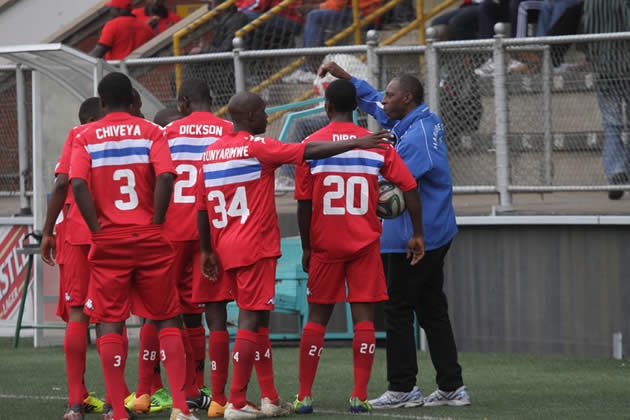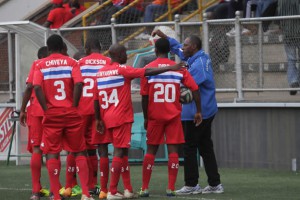
The Sunday Mail

 TIME OUT . . .Harare City mentor Bigboy Mawiwi redirects the formula with his team trailing during a recent Castle Lager Premier Soccer League encounter at Rufaro. Picture by Eddie Muzerengi
TIME OUT . . .Harare City mentor Bigboy Mawiwi redirects the formula with his team trailing during a recent Castle Lager Premier Soccer League encounter at Rufaro. Picture by Eddie MuzerengiGoodwill Zunidza Sports Editor
For a team that came perilously close to snatching the crown away from traditional claimants Dynamos and Highlanders in a thrilling three-horse race that held the nation spellbound for months on end last year, Harare City’s quick fall from grace has been more than alarming.How has it all come about?
A failed bid to propel club chairman Leslie Gwindi to the Zifa throne during elections last month, fierce rows among councillors concerning the team’s sponsorship and then the irreplaceable loss of two prized players could just be some of the factors contributing to the team’s false start to the new season.
But they have all combined to threaten the municipal-owned side’s ranking as one of the title favourites for this season.
Bigboy Mawiwi’s charges have registered three straight losses since the league marathon began three weeks ago and finished bottom in both the Bob 90 Super Cup and Independence Cup competitions, subjecting the coach to unsustainable pressure that is expected to mount with any further setback that the team records.
But with Mawiwi one of the country’s most respected gaffers, focus has inevitably shifted to the management section of the side with many asking if everything is all right.
Unlike teams that struggle due to lack of resources, Harare City are acknowledged as the second richest football club in the country after FC Platinum with their pocket further stiffened by the sale of Soccer Star of the Year runner-up Silas Songani, who moved to Denmark, and captain Godfrey Nguwodzawo, now at big-spending How Mine.
The Sunshine Boys made a tidy profit from the transfers and Songani’s proceeds alone are estimated to be a six-figure sum that has contributed to the $1,6m sum insiders say has been set aside for the team’s 2014 campaign.
Indeed, Harare City – one of only three clubs from the capital remaining in the top-flight division – only learn of financial problems as they occur next door and boast all the pre-requisites for players to not only perform but excel.
Confirmation of this happy fact was derived from a senior player who told The Sunday Mail to forget about a financial drought in the Harare City camp.
“We get our salaries on time every month but obviously there are no bonuses as yet because we have not won any game. However, the club is still to pay our signing-on fees and they promise to settle these once we host a big league match,’’ he said.
Comprising mainly municipal guards as a social outfit in the mid-2000s, Harare City’s rise to the top has been rapid ever since 2010 when they acquired a Division One franchise from ZINWA, through a financial contribution by the council’s medical aid fund, HMMAS.
By the end of the following season Harare City had clinched both the Northern Region First Division championship and sole ticket to the top-flight league, printing an indelible mark last season and finishing number three on the final log standings, but separated from top spot by mere goal difference.
Club secretary Tarisai Kwenda remains confident that the boys will soon regain their footing owing to a variety of factors, not least among them strong support from the executive committee.
“Our policy is that we do not lie to the players. If we promise to pay them on the 45th of the month, that is what we will do, we will not defer until the 54th day. We have got the players’ welfare at heart and there is no problem over remuneration in our team. The results will eventually come,’’ said Kwenda.
She attested that Harare City had retained most of their sponsors, whom the club has never been prepared to divulge, but categorically refuted that the team was funded by ratepayers’ money.
Gwindi, to whom Kwenda referred all further questions on the subject, could not be reached for comment in Bulawayo where he was attending the Zimbabwe International Trade Fair.
The source of the team’s funding came up for heated debate in council chambers recently when uninformed councillors questioned the perceived diversion of ratepayer funds to bankroll its operations, further demanding that income accruing from gate-takings be remitted to council coffers.
Contrary to their assertions, however, research by The Sunday Mail has not detected a direct link from the City Treasurer’s Department that channels funds to the team inasmuch as it has established a close association between Harare City and HMMAS, whose logo is proudly emblazoned on both the players’ kit and the team bus.
A brainchild of employees through their umbrella organisation, Harare Municipal Workers Union (HMWU), the Sunshine Boys are also not obliged to contribute to council revenue through gate-takings, as surmised by some of the councillors during the heated debate.
According to City of Harare’s 2014 budget proposal submitted to council by the former chairperson of the finance and development committee, Clr Alan Markham, the football club is not a beneficiary of ratepayer funds.
The $274m budget presented by Markham’s committee caters only for specified expenditure in refurbishment, rehabilitation and in some cases construction and completion of social infrastructure projects. It also covers purchase of equipment like ambulances, generators and computers and, more crucially, payment of salaries and general expenses such as fuel, water chemicals and electricity.
Neither is the team a benefactor, as the income streams projected to fund the city budget are limited to property tax, refuse collection, Zinara, billboards, the City Architect’s Department, clamping and towing services, health fees, housing and water charges, parks and cemeteries, Metropolitan Police fines, education facilities and city estates.
So passionate for the team was the preceding Harare Mayor Muchadeyi Masunda that he secured twinning arrangements between Harare City FC and German Bundesliga side 1860 Munich, who are owned by the Munich municipality, Harare’s sister city whose mayor visited Town House in 2012.
And despite their winless run, Harare City remains the envy of many in the top-flight league if only for their sound football administration.
“We are not pressing the panic button yet,’’ declares Kwenda, the most senior female official in Zimbabwe club football.
“You can see from our play that we are still matching our standards of last season. That we have not won may be something to do with poor finishing by the strikers, but there is a lot to admire in the players’ passing game. It’s a matter of time before we start picking up points.’’
So what is delaying the resurgence? Inside sources allege mismanagement on the part of team leader Gwindi who is alleged to run a one-man show in which contributions by other executive members are not considered to be of any worth.
“Leslie manages the team like his personal project and has not held any executive meetings this year. Since imposing himself as chairman last year, ostensibly to position himself for a crack at the Zifa job, he has struck a personal and unprofessional relationship with the head coach (Mawiwi) and they run the club as they like, even changing the winning team of last year by questionably bringing in sub-standard players,’’ alleged the source.
He went on: “There were high hopes for this team including privatising it along the lines of Royal Harare Golf Club which is now one of the best golf courses in the world. We want the same for Harare City, first by conquering Africa but our plans are in jeopardy because of a management crisis.
“We can find an investor to partner with, whom we can offer land as our equity in a joint shareholding structure and we look for people who can run the team professionally. Already many companies that do business with council are financing the team operations.’’
As they say, only time will tell.



